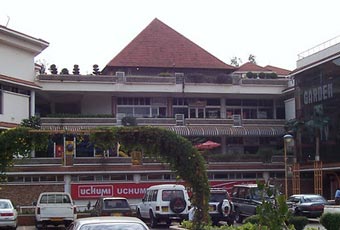
By Patrick Kagenda
Will Kenyan, South African giants leave Ugandan kiosks in the mud?
As Kenya’s leading supermarket chain, Nakumatt gets ready to open shop in Kampala, it seems set on competition with Kenyan rival Uchumi and South African stores Game and Shoprite.
Retail market watchers, however, say the Nakumatt survival strategy had better watch-out for the small roadside supermarkets and shops.
‘Nakumatt must study the mistakes of Uchumi and, before it, Metro Cash & Carry that have suffered because of the resilience of the small shops here,’ a Kenyan businessman living in Uganda told The Independent , ‘The small shops may not have huge capital investments and business skills but the culture of consumers here favours them.’
Unlike Kenya and South Africa where small roadside stores are stocked with emergency items like razor blades, batteries, and candy, Ugandans typically buy all items in small shops near home. These are cheaper, allow purchases of smaller quantities and offer easy credit.
Ironically, since the small shops buy their merchandise from supermarkets and wholesellers, logic would suggest that they would die out as the supermarket culture spreads. They have not.
Nakumatt is keeping a lid on its strategy but the location of its first store, its size, promised variety of items stocked, and its proposed opening of two other stores before 2010, are significant indicators.
Nakumatt’s 75,000 square feet store, with a promised 50,000 different products is to be located in the Oasis Mall on Yusuf Lule Road next to the Garden City Mall which houses Uchumi is a shopping grown for the high- end buyer.
Nakumatt stores in Kenya grossed Shs 85 billion (KShs 3.3bn) in sales during the 2008 Christmas season alone.
Nakumatt is set to compete with Game, located at the Lugogo Shopping Mall in Nakawa and Shoprite with a store at Nakawa and another in downtown Kampala. Next in line are the medium-sized Quality, Capital, and Payless. These have branches strawn around the city and its suburbs. Below these are small ‘supermarkets’ like Kenjoy and others.
Nakumatt has invested US$ 3 million in its Nakumatt Oasis Hypermarket and plans to invest another US$ 2 million in its own expansion plan. Jeff Nchaga, the Uchumi country manager told The Independent that they are not shaken by the coming of Nakummat.
‘I have to admit Nakummat is very strong, but we all have different strategies of doing business,’ he said, ‘We have been here for 5 years and we have built a strong customer base.’Nchaga said Kampala consumers are moving from shopping at kiosks to supermarkets.
‘There is a lot of untapped business in Kampala. Nakummat is a regional supermarket and I hope it will do regional business,’ he said.
He ruled out a price war as the current economic hard times rule out any price cuts.
Nakumatt is no stranger to competition. Starting as a small retail shop in Nakuru dealing mainly in mattresses, hence Nakumatt, it took on then leading household name and near monopoly supermarket Uchumi. Although both deal in similar products, Nakumatt has a reputation of being better managed.
It is known for staying open late, and introducing customer bonuses and promotions like the `cash back scheme’ that allows an ATM card to be used to buy goods and also get some money on top in cash; the MPESA transactions, and the Nakumatt Visa card.Its Operations Director Thiagarajan Ramamurthy was recently awarded the top marketing award in Kenya, the Fellow of the Marketing Society of Kenya (FMSK) award.
Nakumatt has 18 stores in Kenya’s major towns. It has two stores in Rwanda and has plans for four stores in Tanzania. Its regional expansion is part of a plan to be listed on the Nairobi Stock Exchange in 2010.
Its entry into the Uganda market was initially planned for 2007 but was put off mainly because of uncertainty over the small customer base.
Although an affluent class to fraternize large supermarkets has emerged, the most successful operation will be one that penetrates the majority working class consumer. Game, Shoprite, and Uchumi are located in areas that target the rich car-owning class.
Nakumatt needs to avoid the mistake of Metro Cash and Carry which, after positioning itself as an elite-only store, opened too many smaller convenience stores and Lucky 7 centres too quickly under competition from Shoprite. It did not survive. In Kenya, Nakumatt has recently introduced the C-Stores, which are modeled like the Lucky 7s.
Uchumi has opted for the other extreme of running one high-end store with mixed financial fortunes. Nakumatt’s biggest challenger in Kenya today, Tuskys is patronized mainly by the lower-end customers.
Nakumatt has recently suffered set-backs in its Kenya operation.
In November 2008 one of their stores in Nairobi was demolished by the government. It was built on a road reserve. In January 2009, a fire razed a Nakumatt store in downtown Nairobi killing 27 staff. Nakumatt’s parent company, Nakumatt Holdings and Charterhouse were a few years ago linked to money laundering and the evasion of taxes amounting to Shs 0.5 trillion (KShs18 billion). It was set to open shop in April but has since postponed to another date.
 The Independent Uganda: You get the Truth we Pay the Price
The Independent Uganda: You get the Truth we Pay the Price


